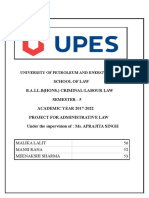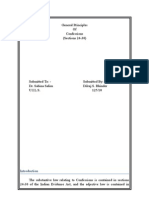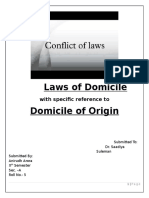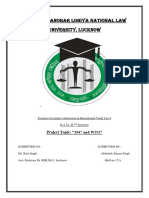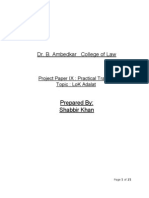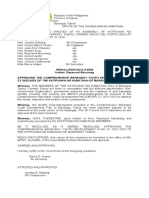0 ratings0% found this document useful (0 votes)
65 viewsDispute Resolution Wto
Dispute Resolution Wto
Uploaded by
arpmittal6111The document describes the process for settling disputes in the WTO. It outlines that WTO members have agreed to use the multilateral dispute settlement system rather than taking unilateral action against other members they believe have violated trade rules. The process involves consultation, the establishment of a panel of experts to make a ruling, the ability to appeal panel rulings, and follow up procedures to ensure rulings are implemented. The goal is for disputes to be resolved within 12-15 months to keep trade flowing smoothly.
Copyright:
© All Rights Reserved
Available Formats
Download as DOCX, PDF, TXT or read online from Scribd
Dispute Resolution Wto
Dispute Resolution Wto
Uploaded by
arpmittal61110 ratings0% found this document useful (0 votes)
65 views7 pagesThe document describes the process for settling disputes in the WTO. It outlines that WTO members have agreed to use the multilateral dispute settlement system rather than taking unilateral action against other members they believe have violated trade rules. The process involves consultation, the establishment of a panel of experts to make a ruling, the ability to appeal panel rulings, and follow up procedures to ensure rulings are implemented. The goal is for disputes to be resolved within 12-15 months to keep trade flowing smoothly.
Original Description:
how disputes resolve in wto
Original Title
dispute resolution wto
Copyright
© © All Rights Reserved
Available Formats
DOCX, PDF, TXT or read online from Scribd
Share this document
Did you find this document useful?
Is this content inappropriate?
The document describes the process for settling disputes in the WTO. It outlines that WTO members have agreed to use the multilateral dispute settlement system rather than taking unilateral action against other members they believe have violated trade rules. The process involves consultation, the establishment of a panel of experts to make a ruling, the ability to appeal panel rulings, and follow up procedures to ensure rulings are implemented. The goal is for disputes to be resolved within 12-15 months to keep trade flowing smoothly.
Copyright:
© All Rights Reserved
Available Formats
Download as DOCX, PDF, TXT or read online from Scribd
Download as docx, pdf, or txt
0 ratings0% found this document useful (0 votes)
65 views7 pagesDispute Resolution Wto
Dispute Resolution Wto
Uploaded by
arpmittal6111The document describes the process for settling disputes in the WTO. It outlines that WTO members have agreed to use the multilateral dispute settlement system rather than taking unilateral action against other members they believe have violated trade rules. The process involves consultation, the establishment of a panel of experts to make a ruling, the ability to appeal panel rulings, and follow up procedures to ensure rulings are implemented. The goal is for disputes to be resolved within 12-15 months to keep trade flowing smoothly.
Copyright:
© All Rights Reserved
Available Formats
Download as DOCX, PDF, TXT or read online from Scribd
Download as docx, pdf, or txt
You are on page 1of 7
Disputes in the WTO are essentially about
broken promises. WTO members have
agreed that if they believe fellow-members
are violating trade rules, they will use the
multilateral system of settling disputes
instead of taking action unilaterally. That
means abiding by the agreed procedures, and
respecting judgements.
A dispute arises when one country adopts a
trade policy measure or takes some action
that one or more fellow-WTO members
considers to be breaking the WTO
agreements, or to be a failure to live up to
obligations. A third group of countries can
declare that they have an interest in the case
and enjoy some rights.
A procedure for settling disputes existed
under the old GATT, but it had no fixed
timetables, rulings were easier to block, and
many cases dragged on for a long time
inconclusively. The Uruguay Round
agreement introduced a more structured
process with more clearly defined stages in
the procedure. It introduced greater discipline
for the length of time a case should take to be
settled, with flexible deadlines set in various
stages of the procedure. The agreement
emphasizes that prompt settlement is
essential if the WTO is to function
effectively. It sets out in considerable detail
the procedures and the timetable to be
followed in resolving disputes. If a case runs
its full course to a first ruling, it should not
normally take more than about one year
15 months if the case is appealed. The agreed
time limits are flexible, and if the case is
considered urgent (e.g. if perishable goods
are involved), it is accelerated as much as
possible.
The Uruguay Round agreement also made it
impossible for the country losing a case to
block the adoption of the ruling. Under the
What is this agreement called?
Understanding on Rules and Procedures
Governing the Settlement of Disputes
More cases can be good news
If the courts find themselves handling an
increasing number of criminal cases, does that
mean law and order is breaking down? Not
necessarily. Sometimes it means that people
have more faith in the courts and the rule of
law. They are turning to the courts instead of
taking the law into their own hands.
For the most part, that is what is happening in
the WTO. No one likes to see countries quarrel.
But if there are going to be trade disputes
anyway, it is healthier that the cases are
handled according to internationally agreed
rules. There are strong grounds for arguing that
the increasing number of disputes is simply the
result of expanding world trade and the stricter
rules negotiated in the Uruguay Round; and that
the fact that more are coming to the WTO
reflects a growing faith in the system.
previous GATT procedure, rulings could
only be adopted by consensus, meaning that
a single objection could block the ruling.
Now, rulings are automatically adopted
unless there is a consensus to reject a ruling
any country wanting to block a ruling has
to persuade all other WTO members
(including its adversary in the case) to share
its view.
Although much of the procedure does
resemble a court or tribunal, the preferred
solution is for the countries concerned to
discuss their problems and settle the dispute
by themselves. The first stage is therefore
consultations between the governments
concerned, and even when the case has
progressed to other stages, consultation and
mediation are still always possible.
How long to settle a dispute? back to top
These approximate periods for each stage of
a dispute settlement procedure are target
figures the agreement is flexible. In
addition, the countries can settle their
dispute themselves at any stage. Totals are
also approximate.
60 days
Consultations, mediation, etc
45 days
Panel set up and panellists
appointed
6 months
Final panel report to parties
3 weeks
Final panel report to WTO
members
60 days
Dispute Settlement Body
adopts report (if no appeal)
Total = 1
year
(without appeal)
60-90 days Appeals report
30 days
Dispute Settlement Body
adopts appeals report
Total = 1y
(with appeal)
3m
How are disputes settled? back to top
Panels
Settling disputes is the responsibility of the
Dispute Settlement Body (the General
Council in another guise), which consists of
all WTO members. The Dispute Settlement
Body has the sole authority to establish
panels of experts to consider the case, and
to accept or reject the panels findings or the
results of an appeal. It monitors the
implementation of the rulings and
recommendations, and has the power to
authorize retaliation when a country does not
comply with a ruling.
Panels are like tribunals. But unlike in a normal
tribunal, the panellists are usually chosen in
consultation with the countries in dispute. Only
if the two sides cannot agree does the WTO
director-general appoint them.
First stage: consultation (up to 60 days).
Before taking any other actions the countries
in dispute have to talk to each other to see if
they can settle their differences by
themselves. If that fails, they can also ask the
WTO director-general to mediate or try to
help in any other way.
Panelists for each case may be chosen from an
indicative list of well-qualified candidates
nominated by WTO Members, although others
may be considered as well, including those who
have formerly served as panelist. Panelists
serve in their individual capacities. They cannot
receive instructions from any government. The
indicative list is maintained by the Secretariat
and periodically revised according to any
modifications or additions submitted by
Members.
Second stage: the panel (up to 45 days for
a panel to be appointed, plus 6 months for the
panel to conclude). If consultations fail, the
complaining country can ask for a panel to be
appointed. The country in the dock can
block the creation of a panel once, but when
the Dispute Settlement Body meets for a
second time, the appointment can no longer
be blocked (unless there is a consensus
against appointing the panel).
Officially, the panel is helping the Dispute
Settlement Body make rulings or
recommendations. But because the panels
report can only be rejected by consensus in
the Dispute Settlement Body, its conclusions
Panels consist of three (possibly five) experts
from different countries who examine the
evidence and decide who is right and who is
wrong. The panels report is passed to the
Dispute Settlement Body, which can only reject
the report by consensus.
are difficult to overturn. The panels findings
have to be based on the agreements cited.
The panels final report should normally be
given to the parties to the dispute within six
months. In cases of urgency, including those
concerning perishable goods, the deadline is
shortened to three months.
The agreement describes in some detail how
the panels are to work. The main stages are:
Before the first hearing: each side in the
dispute presents its case in writing to the
panel.
First hearing: the case for the
complaining country and defence: the
complaining country (or countries), the
responding country, and those that have
announced they have an interest in the
dispute, make their case at the panels first
hearing.
Rebuttals: the countries involved submit
written rebuttals and present oral arguments
at the panels second meeting.
Experts: if one side raises scientific or
other technical matters, the panel may
consult experts or appoint an expert review
group to prepare an advisory report.
First draft: the panel submits the
descriptive (factual and argument) sections of
its report to the two sides, giving them two
weeks to comment. This report does not
include findings and conclusions.
Interim report: The panel then submits
an interim report, including its findings and
conclusions, to the two sides, giving them
one week to ask for a review.
Review: The period of review must not
exceed two weeks. During that time, the
panel may hold additional meetings with the
two sides.
Final report: A final report is submitted
to the two sides and three weeks later, it is
circulated to all WTO members. If the panel
decides that the disputed trade measure does
break a WTO agreement or an obligation, it
recommends that the measure be made to
conform with WTO rules. The panel may
suggest how this could be done.
The report becomes a ruling: The report
becomes the Dispute Settlement Bodys
ruling or recommendation within 60 days
unless a consensus rejects it. Both sides can
appeal the report (and in some cases both
sides do).
Appeals back to top
Either side can appeal a panels ruling.
Sometimes both sides do so. Appeals have to be
based on points of law such as legal
interpretation they cannot reexamine existing
evidence or examine new issues.
Each appeal is heard by three members of a
permanent seven-member Appellate Body set up
by the Dispute Settlement Body and broadly
representing the range of WTO membership.
Members of the Appellate Body have four-year
terms. They have to be individuals with
recognized standing in the field of law and
international trade, not affiliated with any
government.
The appeal can uphold, modify or reverse the
panels legal findings and conclusions. Normally
appeals should not last more than 60 days, with
an absolute maximum of 90 days.
The Dispute Settlement Body has to accept or
reject the appeals report within 30 days and
rejection is only possible by consensus.
The case has been decided: what next?
back to top
Go directly to jail. Do not pass Go, do not collect
. Well, not exactly. But the sentiments apply.
If a country has done something wrong, it should
swiftly correct its fault. And if it continues to
break an agreement, it should offer
compensation or face a suitable response that has
some bite although this is not actually a
punishment: its a remedy, the ultimate goal
being for the country to comply with the ruling.
The priority is for the losing defendant to
bring its policy into line with the ruling or
recommendations, and it is given time to do this.
The dispute settlement agreement stresses that
prompt compliance with recommendations or
rulings of the DSB [Dispute Settlement Body] is
essential in order to ensure effective resolution
of disputes to the benefit of all Members.
If the country that is the target of the complaint
loses, it must follow the recommendations of the
panel report or the appeals report. It must state
its intention to do so at a Dispute Settlement
Body meeting held within 30 days of the reports
adoption. If complying with the recommendation
immediately proves impractical, the member will
be given a reasonable period of time to do so.
If it fails to act within this period, it has to enter
into negotiations with the complaining country
(or countries) in order to determine mutuallyacceptable compensation for instance, tariff
reductions in areas of particular interest to the
complaining side.
If after 20 days, no satisfactory compensation is
agreed, the complaining side may ask the
Dispute Settlement Body for permission to
retaliate (to suspend concessions or other
obligations). This is intended to be temporary,
to encourage the other country to comply. It
could for example take the form of blocking
imports by raising import duties on products
from the other country above agreed limits to
levels so high that the imports are too expensive
to sell within certain limits. The Dispute
Settlement Body must authorize this within 30
days after the reasonable period of time
expires unless there is a consensus against the
request.
In principle, the retaliation should be in the same
sector as the dispute. If this is not practical or if
it would not be effective, it can be in a different
sector of the same agreement. In turn, if this is
not effective or practicable and if the
circumstances are serious enough, the action can
be taken under another agreement. The objective
is to minimize the chances of actions spilling
over into unrelated sectors while at the same
time allowing the actions to be effective.
In any case, the Dispute Settlement Body
monitors how adopted rulings are implemented.
Any outstanding case remains on its agenda until
the issue is resolved.
You might also like
- Essential Soft Skills for Lawyers: What They Are and How to Develop ThemFrom EverandEssential Soft Skills for Lawyers: What They Are and How to Develop ThemNo ratings yet
- Curative PetitionDocument14 pagesCurative PetitionHarman SainiNo ratings yet
- LYDCDocument13 pagesLYDCDennis Cosmod100% (1)
- RA No. 7942: Philippine Mining Act of 1995Document5 pagesRA No. 7942: Philippine Mining Act of 1995Zachary AstilleroNo ratings yet
- Movie Analysis - Dekada 70Document4 pagesMovie Analysis - Dekada 70EmelisaSadiaLabuga100% (1)
- IBEW NMA AgreementDocument16 pagesIBEW NMA AgreementJoe RipplNo ratings yet
- FINALLLL Comparative Study 14.05.2023Document23 pagesFINALLLL Comparative Study 14.05.2023SAHARSH MAHESHWARINo ratings yet
- Hart DworkinDocument11 pagesHart DworkinNur SyazwinaNo ratings yet
- Copyright Study MaterialDocument33 pagesCopyright Study MaterialHeaven DsougaNo ratings yet
- COMPANY LAW AryanDocument14 pagesCOMPANY LAW Aryansurima singhNo ratings yet
- Admin 50..52..53..Document15 pagesAdmin 50..52..53..Meenakshi SharmaNo ratings yet
- Liberalisation of Legal Services in India Through GATSDocument14 pagesLiberalisation of Legal Services in India Through GATSGovind Singh TomarNo ratings yet
- Dr. Ram Manohar Lohiya National Law University, Lucknow 2018Document10 pagesDr. Ram Manohar Lohiya National Law University, Lucknow 2018Raj kiranNo ratings yet
- Application of Sanitary and Phytosanitary Measures: Submitted For The Partial Fulfilment of The B.A.LLB (Hons.) - CourseDocument27 pagesApplication of Sanitary and Phytosanitary Measures: Submitted For The Partial Fulfilment of The B.A.LLB (Hons.) - CourseAtul KumarNo ratings yet
- ConfessionDocument26 pagesConfessionEbadur Rahman100% (1)
- Conflict AnirudhDocument28 pagesConflict AnirudhAnirudh AroraNo ratings yet
- Impact and Implementation of International Human Rights Norms in Indi1Document8 pagesImpact and Implementation of International Human Rights Norms in Indi1Sohan SutharNo ratings yet
- Place of Effective ManagementDocument34 pagesPlace of Effective ManagementRIcky Chopra International CounselsNo ratings yet
- 02 01 PDFDocument12 pages02 01 PDFArchana NairNo ratings yet
- Administrative Law PDFDocument19 pagesAdministrative Law PDFUshaNo ratings yet
- Damodaram Sanjivayya National Law University Visakhapatnam: Submitted By: Harshit Malviya 2016039 Semester ViDocument24 pagesDamodaram Sanjivayya National Law University Visakhapatnam: Submitted By: Harshit Malviya 2016039 Semester ViHarshit MalviyaNo ratings yet
- International Trade LawDocument7 pagesInternational Trade LawAnkush JadaunNo ratings yet
- Ipr Project 6th SemDocument22 pagesIpr Project 6th SemkomalNo ratings yet
- Transboundary Movements of Hazardous Wastes and Their DisposalDocument17 pagesTransboundary Movements of Hazardous Wastes and Their DisposalSANANo ratings yet
- Dr. Ram Manohar Lohiya National Law University, Lucknow: Project Topic-"1947 and WTO"Document14 pagesDr. Ram Manohar Lohiya National Law University, Lucknow: Project Topic-"1947 and WTO"Abhishek K. SinghNo ratings yet
- Land Law ProjectDocument21 pagesLand Law ProjectNandesh vermaNo ratings yet
- Appointment of Arbitrators by The Designate Under The Arbitration and Conciliation Act A CritiqueDocument8 pagesAppointment of Arbitrators by The Designate Under The Arbitration and Conciliation Act A CritiqueKannanPNairNo ratings yet
- With Voice Recording - ICJDocument24 pagesWith Voice Recording - ICJWoke MillennialsNo ratings yet
- Role, Power and Function of Advance RulingDocument16 pagesRole, Power and Function of Advance RulingEesha GuptaNo ratings yet
- ABHUDAY Pvt. Int. Law ProjectDocument19 pagesABHUDAY Pvt. Int. Law ProjectPrashant Yadav0% (1)
- Dr. Ram Manohar Lohia National Law University, Lucknow: International Trade Law Project OnDocument22 pagesDr. Ram Manohar Lohia National Law University, Lucknow: International Trade Law Project Onsakshi singhNo ratings yet
- Dr. Ram Manohar Lohia National Law University, Lucknow: Synopsis OnDocument5 pagesDr. Ram Manohar Lohia National Law University, Lucknow: Synopsis Onsakshi singhNo ratings yet
- International Law ProjectDocument10 pagesInternational Law ProjectRavindra JalaNo ratings yet
- Comparative Advertisement - Testing Its Foundation and Evaluating Its ScopeDocument16 pagesComparative Advertisement - Testing Its Foundation and Evaluating Its ScopeSarthak KapilaNo ratings yet
- CPC AssignmentDocument18 pagesCPC AssignmentUtkarsh LodhiNo ratings yet
- Adr FinalDocument13 pagesAdr Finalaayaksh chadhaNo ratings yet
- Admin Final Section CDocument21 pagesAdmin Final Section CTanmayNo ratings yet
- Assignment On Antidumping: An Indian PerspectiveDocument11 pagesAssignment On Antidumping: An Indian Perspectivehaidersyed06No ratings yet
- Banakhat With Possesion EnglishDocument4 pagesBanakhat With Possesion EnglishHR Siddhi ConstructionsNo ratings yet
- National Law Institute University Bhopal: Project - Administrative Law SebiDocument20 pagesNational Law Institute University Bhopal: Project - Administrative Law SebiSurbhi LaddhaNo ratings yet
- Carriage of Goods by SeaDocument17 pagesCarriage of Goods by Seagaurav singhNo ratings yet
- Environmental Law ProjectDocument28 pagesEnvironmental Law ProjectAmit VikramNo ratings yet
- Prohibited Subsidies: Chanakya National Law UniversityDocument22 pagesProhibited Subsidies: Chanakya National Law UniversityRajat KashyapNo ratings yet
- Talking Points-Judicial RestraintDocument12 pagesTalking Points-Judicial RestraintBrandon McNally100% (1)
- Compition Law Sitaram ProjectDocument31 pagesCompition Law Sitaram ProjectprafullaNo ratings yet
- India and Icj ProjectDocument50 pagesIndia and Icj ProjectAditya PandeyNo ratings yet
- Sources of International LawDocument14 pagesSources of International LawSimran Kaur KhuranaNo ratings yet
- Section 11 of Sale of Goods Acts StateDocument9 pagesSection 11 of Sale of Goods Acts Stateshivanika singlaNo ratings yet
- Online Answer Sheet Submission Name-Mohd Izaan Rizvi Class - 8 Semester (Regular) Roll No - 33 SUBMISSION DATE - 30/05/2020 SESSION - 2019-2020Document31 pagesOnline Answer Sheet Submission Name-Mohd Izaan Rizvi Class - 8 Semester (Regular) Roll No - 33 SUBMISSION DATE - 30/05/2020 SESSION - 2019-2020Izaan RizviNo ratings yet
- Individual Assignment WtoDocument12 pagesIndividual Assignment WtoRaimi MardhiahNo ratings yet
- Rajivgandhi National University OF LAW PunjabDocument35 pagesRajivgandhi National University OF LAW PunjabPriyankMangalNo ratings yet
- "GATT" and "WTO" and Indian EconomyDocument20 pages"GATT" and "WTO" and Indian EconomyTarun Purohit100% (1)
- Assignment of Ibdrm On ConciliationDocument5 pagesAssignment of Ibdrm On Conciliationdeepti tiwariNo ratings yet
- Lok Adalat in IndiaDocument21 pagesLok Adalat in IndiaDrShabb0% (1)
- Project Work of Taxation Law ON The Case Laws MOHINI THAPAR V. C.I.T. (1972) 4 SCC 497 Submitted byDocument6 pagesProject Work of Taxation Law ON The Case Laws MOHINI THAPAR V. C.I.T. (1972) 4 SCC 497 Submitted bySaiby KhanNo ratings yet
- Background: Censorship in The MediaDocument26 pagesBackground: Censorship in The MediaManDeepWarwalNo ratings yet
- Regional Trading ArrangementDocument21 pagesRegional Trading ArrangementSnigdha SinghNo ratings yet
- Environment Law Porject Sem 4 Sara ParveenDocument20 pagesEnvironment Law Porject Sem 4 Sara ParveenSara ParveenNo ratings yet
- Assignment 1 (P.i.l.)Document20 pagesAssignment 1 (P.i.l.)Anjuman Jangra 406No ratings yet
- Environment Law FileDocument12 pagesEnvironment Law FileJaspreet ChandiNo ratings yet
- Subject The Code of Civil Procedure, 1908: Icfai University, Dehradun Icfai Law SchoolDocument15 pagesSubject The Code of Civil Procedure, 1908: Icfai University, Dehradun Icfai Law SchoolAshwina NamtaNo ratings yet
- Constitutional Compatibility of Article 21 With Reference To Concept of LibertyDocument54 pagesConstitutional Compatibility of Article 21 With Reference To Concept of LibertyrichaNo ratings yet
- Final DraftDocument11 pagesFinal DraftSakshiSinghNo ratings yet
- Investigation into the Adherence to Corporate Governance in Zimbabwe’s SME SectorFrom EverandInvestigation into the Adherence to Corporate Governance in Zimbabwe’s SME SectorNo ratings yet
- S.R.Batra V. SMT Taruna BatraDocument6 pagesS.R.Batra V. SMT Taruna BatraKeshav AggarwalNo ratings yet
- Baxter V Scientology: FSSO's Motion To Compel Arbitration (Amended Complaint)Document25 pagesBaxter V Scientology: FSSO's Motion To Compel Arbitration (Amended Complaint)Tony OrtegaNo ratings yet
- FACULTY ASSOCIATION OF MAPUA INSTITUTE OF TECHNOLOGY (FAMIT) vs. HON. COURT OF APPEALSDocument1 pageFACULTY ASSOCIATION OF MAPUA INSTITUTE OF TECHNOLOGY (FAMIT) vs. HON. COURT OF APPEALSAreeNo ratings yet
- Vs. ATTY. GREGORIO E. ARIOLA, JR., RespondentDocument2 pagesVs. ATTY. GREGORIO E. ARIOLA, JR., RespondentRonnielNo ratings yet
- Key Take-Away or Doctrine To RememberDocument1 pageKey Take-Away or Doctrine To Rememberk santosNo ratings yet
- Federalist Paper 51 SummaryDocument2 pagesFederalist Paper 51 Summaryapi-522679657No ratings yet
- CK ImageDocument237 pagesCK ImagerathmoneNo ratings yet
- Case Digests On Arts 247 248 249Document35 pagesCase Digests On Arts 247 248 249Jenaro CabornidaNo ratings yet
- HFL1501 Ass 6Document5 pagesHFL1501 Ass 6mamafilwe21No ratings yet
- Bachelor Express, Incorporated v. Court of AppealsDocument3 pagesBachelor Express, Incorporated v. Court of AppealsJerica MercadoNo ratings yet
- Topic 2 Residence Status For IndividualDocument23 pagesTopic 2 Residence Status For IndividualHANIS IZYAN MAT ISANo ratings yet
- Recent SC Decision On JurusdictionDocument25 pagesRecent SC Decision On JurusdictionVipul ShahNo ratings yet
- Anti Ragging Affidavit - Parent and StudentDocument2 pagesAnti Ragging Affidavit - Parent and Studentkasetty24babuNo ratings yet
- Valenzuela CityDocument4 pagesValenzuela CityKweeng Tayrus Faelnar100% (1)
- RESOLUTIONSDocument4 pagesRESOLUTIONSjovelyn dahangNo ratings yet
- Law of Contract I PDFDocument71 pagesLaw of Contract I PDFSharath AlimiNo ratings yet
- 323-1851-102.6 (6500 R12.72 PhotonicsEqpt) Issue2Document690 pages323-1851-102.6 (6500 R12.72 PhotonicsEqpt) Issue2MD. SHEFAUL KARIM100% (10)
- Brief For The Respondents in Opposition, Lech v. Jackson, No. 19-1123 (June 3, 2020)Document41 pagesBrief For The Respondents in Opposition, Lech v. Jackson, No. 19-1123 (June 3, 2020)RHTNo ratings yet
- Status of Projects Under Eo 70 As Amended by Eo 465Document16 pagesStatus of Projects Under Eo 70 As Amended by Eo 465Wolfgang De TorreNo ratings yet
- Local Self GovernmentDocument13 pagesLocal Self GovernmentVivek Rai100% (5)
- PNB Vs Getway Property Holdings Inc. Civpro.Document2 pagesPNB Vs Getway Property Holdings Inc. Civpro.Ye Seul DvngrcNo ratings yet
- Rule 3 s12 - Mathay Vs Consolidated Bank and Trust CompanyDocument1 pageRule 3 s12 - Mathay Vs Consolidated Bank and Trust CompanyLoury Luzadio100% (1)
- 30 Barcelona V BarcelonaDocument2 pages30 Barcelona V BarcelonaJuan Samuel IsmaelNo ratings yet
- Inheritance in Islamic LawDocument5 pagesInheritance in Islamic LawAlas RameNo ratings yet
- National Gender Policy 2006 - 1661900500Document30 pagesNational Gender Policy 2006 - 1661900500dkulffyNo ratings yet
- International Law, Admiralty, Maritime Process, Form #09.061Document228 pagesInternational Law, Admiralty, Maritime Process, Form #09.061Sovereignty Education and Defense Ministry (SEDM)100% (2)










